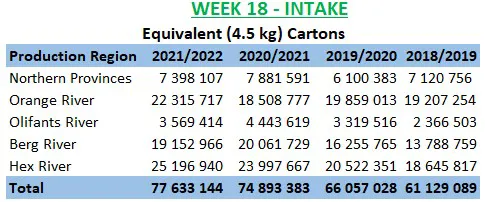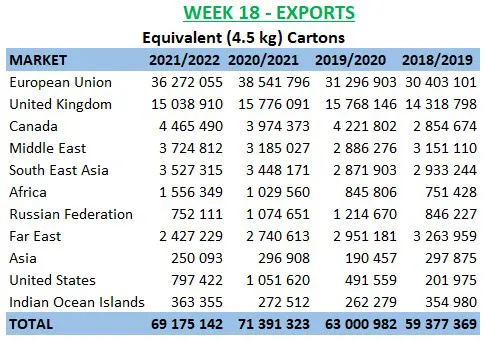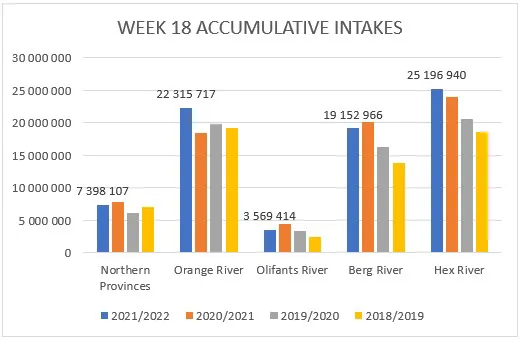SATI has released the weekly grape figures in their newsletter, while looking back on the lessons learned while attending Fruit Logistica in Berlin.
National Overview
The 2021/2022 harvesting season has officially drawn to a close, with all regions having completed packing.
National intake volumes have reached 77 633 144 cartons (4.5kg equivalent) by week 18, representing an increase of 3.6% in comparison to week 18 in 2020/2021.

Export volumes are not final yet, as more data is expected to be reported on. There have been some notable differences in export volumes, such as a 30% decrease in Russian Federation exports due to the ongoing conflict in the region. We have also seen an increase in exports to the Middle East and South-East Asia, with the regions increasing by 17% and 2.3% respectively, in comparison to week 18 in 2020/2021.
Producers have worked relentlessly this season to battle unforeseen odds and SATI acknowledges the efforts that have gone into producing a high-quality yield. SATI remains deeply concerned about the financial state of our industry given the multitude of challenges faced during the season as well as the economic impact of these on our industry.

Fruit Logistica Berlin Insights:
SATI attended Fruit Logistica Berlin 2022, which was the first event staged since the Covid-19 restrictions. The event was well organised, and attending was a fruitful experience with opportunity to connect with industry stakeholders from across the globe.
Key insights learned:
- The high inflation in Europe is globally recognised as a concern due to the pressure it’s placing on the agribusiness value chain
- Port congestion has been experienced worldwide, with many markets experiencing delayed shipping times/cold storage challenges and extended times to market
- The increased cost of shipping is a global concern, and it is anticipated that industry will start to consider alternative/innovative solutions to this challenge

The SATI team met with numerous industry stakeholders and can share the following observations, which could be of value to producers:
- The chemical industry is seeing a move to more biological products, with an increased need for alternative solutions – largely due to new challenges faced because of climate change
- A large multinational player currently focussed on growing small-scale farmers, both with development and access to technology
- They are rolling out a project to reach 10 million small scale farmers and provide them access to an electronic platform that will share farming insights, crop science info and guidelines on growing food for own consumption
- SHAFFE has shifted their focus to a more member-driven strategy, with projects defined in 3 key areas:
- What sustainability means for the southern hemisphere & driving defined actions in this regard via a SHAFFE-led task force
- Driving a global coalition to discuss the rising costs of logistics, to ensure fresh produce has a voice
- Formation and training – specifically targeted at middle management in the industry to remain abreast of global context.
In partnership with a European university, SHAFFE has created the first ever 1-year Masters programme for the fresh produce industry. The programme will be run online and will be industry led, with more than 60% of lecturers coming from industry. The scope will be broad to ensure global perspective, and the degree will be globally accredited. SHAFFE will be sharing more detail in the next few weeks. - Discussions were held with producers and cultivar owners. Key trends include concerns about the length of time it takes to approve plant material in South Africa and the need to engage government on these timelines. Possibly also investigating alternative solutions relating to quarantine periods.
Informal feedback from the industry was predominantly centred on logistics challenges, congestion at the ports, the high cost of shipping and delayed routes to market. Conventional vehicles and the role they are expected to play in the coming year was a key point of discussion, with it expected that the use of conventional ships will be explored again in future.
Industry seems keen to rethink the traditional logistical chain regarding Cape Town and Durban ports and explore alternatives to mitigate the challenges currently being experienced. Urgent political will and intervention is required to ensure we see real progression in regard to these matters.
For more information:
AJ Griesel
South African Table Grape Industry
Tel: +27 21 863 0366
www.satgi.co.za

